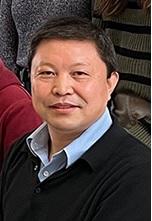Biography
Dr. Wang gained his Bachelor’s and Master’s degrees in Biology from Nankai University in China. He then received his Ph.D. in Neurobiology from the University of Heidelberg in Germany, where he worked on neuroendocrine secretion with Dr. Wieland Huttner. Before joining the UM faculty, he worked with Dr. Graham Warren at Yale University, first as a Postdoc Associate, then as a Research Scientist. At Yale, he worked on Golgi structure and function.
Areas of Interest
1. Golgi biogenesis, function, and defects in diseases
2. Membrane trafficking
3. Cell cycle regulation
4. Cell biology and diseases, including cancer, asthma and Alzheimer’s disease
5. Post-translational modifications, including phosphorylation, ubiquitination, N- and O-glycosylation
Published Articles or Reviews
-
Ahat E, Song Y, Xia K, Reid W, Li J, Bui S, Zhang F, Linhardt RJ, Wang Y. GRASP depletion-mediated Golgi fragmentation impairs glycosaminoglycan synthesis, sulfation, and secretion. Cell Mol Life Sci. 2022 Mar 21;79(4):199. doi: 10.1007/s00018-022-04223-3.
- Zhang X, Wang Y. (2020) Non-redundant roles of GRASP55 and GRASP65 in the Golgi apparatus and beyond. Trends Biochem Sci. 2020 Sep 4;S0968-0004(20)30198-5.
- Zhang X, Wang L, Lak B, Li J, Jokitalo E, Wang Y. (2018) GRASP55 senses glucose deprivation through O-GlcNAcylation to promote autophagosome-lysosome fusion. Dev Cell. 2018 Apr 23;45(2):245-261.e6. doi: 10.1016/j.devcel.2018.03.023.
- Joshi G., Y. Chi, Z. Huang and Y. Wang. (2014). Aβ-induced Golgi fragmentation in Alzheimer’s disease enhances Aβ production. PNAS Plus, 111: E1230-9.

